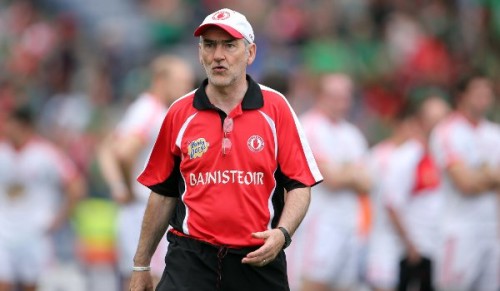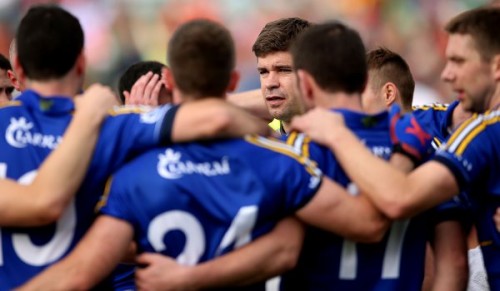SIX weeks before the start of the 2010 Championship, Conor Counihan took his players to Bere Island.
There, four officers from the Irish Army spent the weekend getting the Cork footballers to do shuttle runs wearing gas masks, uphill runs with weighted down rucksacks thrown onto their backs, belly crawls under nets and jumps into the sea to fill water bins.
As a motivational tool, Bere Island became Cork's reference point, even deep into that year's All-Ireland final against Down. "With about 10 minutes to go, I heard the boss shouting 'Bere Island, Bere Island'," Aidan Walsh, their midfielder, said.
"He always said that what you went through there you'd never go through again. We all got through that together. We knew that whatever would come at us during the Championship, it wouldn't be tougher than that."
All of which sounds terribly impressive until you remember that in the last 10 minutes of that All-Ireland final, Down outscored Cork by four points to two. Nor did Bere Island seem to matter when Cork lost to Kerry in that year's Munster semi-final replay.
Perhaps the unity formed from a weekend of hardship proved to be a factor in their All-Ireland semi-final victory over Dublin? Or perhaps Ross McConnell's concession of a penalty had a bigger impact on the result?
It's hard to know. But what is easier to figure out is that since the emergence of Kevin Heffernan and Mick O'Dwyer in the 1970s, the cult of the GAA manager has grown. Some have proven to be lucky generals, some to be good ones.
Counihan was a bit of both. He claimed one All-Ireland and could just as easily have won another two. But his teams fell short. The slice of luck they enjoyed against Dublin in 2010 was absent in 2009 and 2011. He isn't the only manager to have been blessed as well as cursed.
"When I think back to 1995," Ger Loughnane recently said of that magical summer when the Bannermen ended decades of neglect and hurt, "fortune shone on us.
“Against Cork in the Munster semi-final, for example, Clare missed a lot of easy scores in the first half, very much like the old Clare. But three incidents helped us to win, and made the players start believing they were going somewhere.
"One was Seanie McMahon staying on the field after breaking his collarbone. He'd end up winning the sideline which led to the winning goal.
"The second thing was that Fergie Tuohy took that sideline, and Ollie Baker put the ball in the net. Normally, Fergie wouldn't be let near a sideline!
"Then, in the last seconds, Brian Lohan made an incredible interception.
"That day was the first time Lady Luck smiled on Clare. You go weak in the knees thinking back as things could have been very different.
"If Cork had won, that whole era for Clare - with two All-Irelands and three Munster titles - might never have started."
Such self-deprecation is uncommon among managers in any sport, not just the GAA, where oversized egos appear to be a pre-requisite for the majority of men who take on the role.
Anyone that knows Loughnane has learned to appreciate how frankness is part of his nature. And as one of the greatest managers in hurling's history, he effectively has admitted that his - and Clare's success - came down to freakish circumstances as much as talented leadership.
The reality is that very often you need both elements to claim an All-Ireland. Don't forget you need good players too. Think back to 2002.
Armagh, four points down in the All-Ireland final, watched their manager, Joe Kernan, take his losers' plaque from the 1977 decider and smash it against the dressing-room wall.
Within 40 minutes, they had overturned their deficit to emerge as one-point winners and first-time champions. Was Kernan's smashed plaque the inspiration that drove them to the pinnacle of their personal Everest?
Or were the performances of Kieran McGeeney, Aidan O'Rourke, Paul McGrane, Ronan Clarke and Oisin McConville more critical?
The same questions relate to 2003. That summer Tyrone's players listened to the same songs on the team bus match after match. Bob Dylan's 'Knocking On Heaven's Door' was on the play-list and at half-time in the final with Armagh, Brian Dooher barked to his players that they were going to ''kick down heaven's door''.
Tyrone won. Did they do so because of Mickey Harte's astute choice of music or was it because Conor Gormley threw his body on the line when Steve McDonnell was aiming his shot at their goal?
Often we overplay the role of the manager in a team's success. We remember how Padraig Harrington spoke to both the Ireland rugby team and the Kilkenny hurlers in 2009, and how both teams ended their year in glory. Harrington also spoke to the Dublin footballers in 2008 - the year that they were hammered by Tyrone in an All-Ireland quarter-final.
That was the year Paul Caffrey, the Dublin manager, provided his players with the 'Blue Book', a motivational manual that was widely ridiculed after it was leaked following the Tyrone defeat.
As Ciaran Whelan pointed out, the concept was a clever one, but only became the subject of scorn because of the result. "If we had won the All-Ireland, it would have been seen as a genius idea,'' said Whelan. "It was just someone being opportunistic in putting the boot in. I felt there was a lot of good stuff in it. Fellas were buying into it.
"I think he (Caffrey) was trying to follow a concept that Clive Woodward had with the England rugby team - a black book. I remember reading Woodward's book and when we did it, it was along similar lines - general team rules, principles."
England won so Woodward was labelled a genius and Dublin lost, so Caffrey was depicted a fool.
The reality is a lot less simple. To win an All-Ireland you need good players more than you need a good manager. Otherwise Mick O'Dwyer would have won All-Irelands with Laois, Wicklow, Clare, and Kildare.
Just as we cannot overplay the manager's role, we cannot underplay it either. Under O'Dwyer, Kildare may not have won an All-Ireland, but they did get to their first final since 1928 and won a Leinster title for the first time since 1956 before claiming another in 2000. Then he was off to Laois who became Leinster winners for the first time in 57 years under his watch. Neither team have won one since.
Clever management clearly played its part in Kerry's All-Ireland last year, too. Under Eamon Fitzmaurice, a team which appeared to be on the slide was rebuilt into a tactically astute, powerful unit.
"People outside of Kerry think we are greedy, that it’s great for the GAA for Dublin to win an All-Ireland and that Kerry have enough won,'' Fitzmaurice wrote after the 2011 All-Ireland final.
"Until you understand that Kerry never have enough won, you won’t understand Kerry."
Fitzmaurice understood. That's management. But, as outsiders, we also need to understand that in winning, teams require a rub of the green along the way. In the All-Ireland semi-final replay, Mayo's two best players, Cillian O'Connor and Aidan O'Shea, suffered head-injuries. Kerry saw the game out in extra-time.
Then in the final, they scraped past Donegal, scoring two opportunist goals. "For their first goal, I got a half-block on the ball," said Karl Lacey, Donegal's All-Star defender. "If I hadn't blocked it, it would have gone over the bar.
"Instead, it dropped short to Paul Geaney and he put in the net."
Can you say that goal came down to good management or good luck? The answer is both. It was Fitzmaurice who made Geaney believe in himself. It was fate which allowed the ball drop his way.
That, in a nutshell, is the modern game. Managers matter. So does luck. But players determine results. That remains the bottom line.




